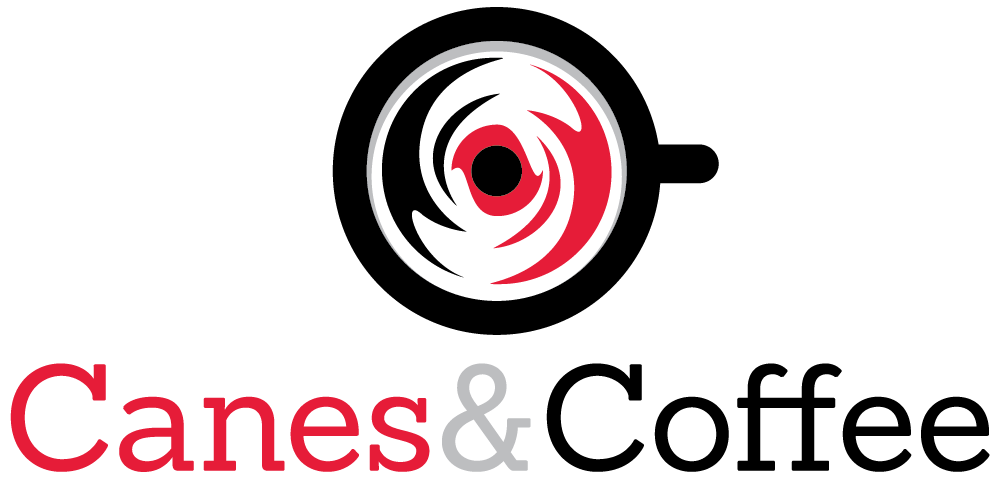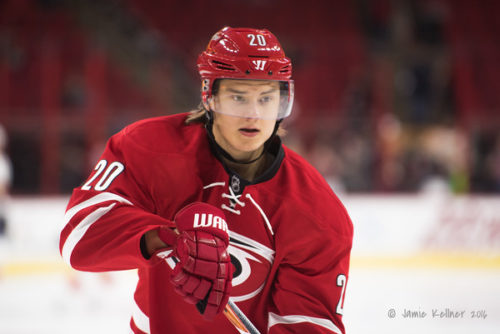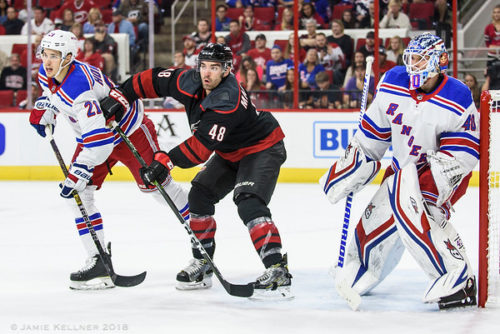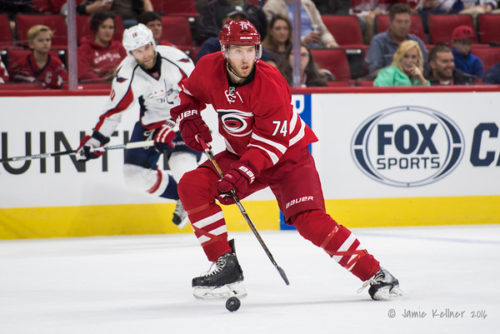If you missed it yesterday, our 2018 NHL trade deadline series for the Carolina Hurricanes kicked off with an article that set the stage by assessing the current state of the team and its playoff hopes, identifying potential improvements and also included a reminder on Francis’ strategy and the supposed market demands for players.
You can find that article HERE.
Carolina Hurricanes trade deadline quick hitters
Ron Francis: One of the things that surprises me is the number of people who do not think Francis gets the current state of the team and its weaknesses and room for potential improvement. I think that is completely misguided. While I do think it is fair to debate or question Francis ability as a deal maker, perhaps his leaning too much toward protecting the prospect pool over winning now and whatever else, he understands the current situation with the team.
Two year bridge players: Most of the deals at the trade deadline are for players who are short-term playoff help with contracts that expire at the end of the 2017-18 season. And in cases where the Hurricanes consider paying heavily for a player, how long they are signed for quickly comes up. And more is generally considered better — would be a shame to trade for a player and then have him leave after only a couple years. But I actually like the idea of adding a forward signed through the 2018-19 season (yes Pacioretty qualifies). That time frame offers two tries to help the team push into the playoffs. It also potentially frees up salary and offers flexibility when all of Sebastian Aho, Teuvo Teravainen, Jeff Skinner and Haydn Fleury are up for new contracts. Maybe most significantly, two years buys time for the younger forwards to hopefully grow into top 6 forward slots without being pressured to do so before they are ready. Players who could provide forward help on this intermediate term include Max Pacioretty, Derek Brassard, Gustav Nyquist and Mats Zuccarello.
Considering the categories
I will save the individual player assessments for a bit later, but an important starting point is understanding the kinds of deals that Francis must consider over the next week.
High-end “rentals”
As noted above, the most common deals at the trade deadline are for players whose contract expires at the end of the current season. Though such players could re-sign with the team to which they are traded, the general idea is that the player is acquired to help the team get into the playoffs and/or to win once they get there.
The positive with these deals is that the teams who possess these players have a strong incentive to trade them or otherwise likely lose them for nothing to free agency on July 1. The negative with these players is that they can still cost a lot for a short-term fix and with no guarantee that the rental pays results.
A few from the list: The list has a couple big names this year starting with Evander Kane and Rick Nash.
From a Hurricanes perspective: I will be very surprised if Francis plays in the high end of this pool. At the most basic level, spendinga bunch of futures for a short-term fix flies in the face of everything that Francis has said and done for more than three years since taking over as general manager. Further, even with a big addition, the Hurricanes are very likely not ready to be a Cup contender just yet anyway.
Inexpensive depth rentals
Also from the pool of rentals is a larger set of depth players who might be had for a reasonable price. Every trade deadline, there are a decent number of players who do not move at all and a few others who go for discounts when teams take what they can get rather than keeping them and instead getting nothing. While I think that Francis’ bias for not spending futures to add short-term fixes still applies, at some price this could be a possibility.
A few from the list: Patrick Maroon, Michael Grabner.
From a Hurricanes perspective: Again, I think there is a bias against trading futures for rentals, but with a history as a value shopper, I could see Francis grabbing a fourth-round draft pick and looking for a sale on Monday to see if he can get a good player for that modest price.
True player for player shake up trades
In my opinion, the most interesting possibility for the week ahead is that Francis swings a blockbuster of sorts that moves a top half of the roster player in return for another to shake things up. Per my comments on Francis in the quick hitters above, he is not oblivious to the fact that the current formula just is not working yet. Both Justin Faulk and Jeff Skinner’s names have popped up in the trade mill already. It is hard to say if there is any validity to their mentions, but what we do know from three years of Ron Francis is that nothing leaks out of his office at 1400 Edwards Mill Road, so if such a deal were going to happen, it would most assuredly just fall suddenly out of the sky.
A few from the list: I think the big names from the Hurricanes side are Jeff Skinner and Justin Faulk. There is enough value there that the potential return could be any number of top half of the roster players most likely to come from teams also looking to shake things up a bit.
From a Hurricanes perspective: I put the probability of a blockbuster as low but probably as high as any point during Francis’ tenure except last summer. Also worth noting is that deals like this are more common during the offseason when more teams have cap flexibility, and there is less focus on the upcoming playoffs.
Futures for upgrades
Somewhat similar to the previous category is seeking a deal for a difference-maker but paying primarily with futures rather than an even player swap. As the Carolina Hurricanes rebuild continues to stretch in time with no guarantee of even the first level of success which is reaching the playoffs, I think this is the kind of deal that Francis really needs to find. There is a limit to not wildly overpaying in futures and damaging the future, but at the same time there must be a recognition that there is no guarantee EVER that just being patient will pay off. What if Francis waits out the 2017-18 season without trying to capitalize on the opportunity in front of him, and then the team suffers a series of major injuries that derail the 2018-19 season and lead to another playoff miss.
A few from the list: Max Pacioretty, Alex Galchenyuk, Ryan Nugent-Hopkins, Mike Hoffman, Derek Brassard are just a few of the players with term remaining on their contract who might be available primarily for futures.
From a Hurricanes perspective: As I said above, I really think this is the kind of deal that Francis needs to find to help push this team over the hump and into the playoffs. The positive is that with contract term for these players, even if the Hurricanes still miss the 2017-18 playoffs, the acquired player provides longer-term help.
The goalie thing
I wrote about this in more detail earlier this week, but I will also include it here for thoroughness. As I said previously, the potential to move Scott Darling at the trade deadline and start over is very low. Most teams are shopping for help specifically for the 2017-18 season, so a struggling goalie who has not been very good even as a backup does not fit the bill. If something is going to happen with Darling, the offseason would be much more likely. But might the Hurricanes add help in the form of a rental whose contract ends at the end of of the 2017-18 season. In that regard, on Monday the Flyers acquired goalie Petr Mrazek for conditional third and fourth round draft picks.
A few from the list: The challenge is finding a goalie who is a rental from a team that is out of the playoff chase.
From a Hurricanes perspective: This deal is also complicated from a relationship perspective. If the Hurricanes push into 2018-19 with Scott Darling, adding rental help right now might be damaging in terms of that relationship. That makes it likely that Francis will opt to just ride things out for the 2017-18 season.
Go Canes!




I’d be very surprised if Chucky, patches, Hoffman, or RNH are available for futures. Brassard, maybe.
Montreal-need to turn their roster over with new players to get them competitive again
Senators-Ditto, they dont want to give Colorado a good pick next year
Edmonton- need roster players to compliment McD and Draisaitl.
Goalies- It will be interesting to see how they handle the situation. A lot of moving pieces and it has a large implication on our future.
Does anyone really think Chucky would be a good acquisition? I just can’t seem to wrap my head around him being worth what he would cost. Patches, Hoffman, and RNH I would be good with at the right price (No bean or Necas and no 1st round picks).
Contract quantity may be an issue. I’m not 100% sure but think RF has his 50 contracts. If that’s the case, he needs to move contracts to take an existing player. My guess if he was hoping to make the playoffs, but sign some Charlotte folks like Tolchinsky to free up space.
There was talk on another site about maybe Necas comes over after his season is fine in Europe, but I think this contract thing prevents that.
I just don’t see us making a major hockey trade at the deadline, maybe just for a minor tweak or two.
One possible trade may involve us selling Stempniak and/or Ryan (PIT rumors) and then using the return with a pick/prospect to moderately upgrade. Something more modest like that is much more likely, with the bigger deal happening near the draft.
And virtus – I’m not a fan of paying up for Chucky either. Let someone else take the chance on him. I’d much rather have RNH.
Overall Approach: I like Matt’s reasoning about the type player we should be looking for.
Specific Players: Everyone above has valid ideas as far as I know. i.e.; their choices are as good as any I could make. I might add that I would consider Gallagher from Montreal as good a target as Pacioretty. Looking at teams who need defensemen I see Edmonton (they can take their time), Toronto (they need one now going into playoffs), and Tampa Bay (they need one now going into the playoffs). Tampa Bay has Johnson who is a top line forward who is a proven playmaker and 20 goal scorer. Toronto has James Van Reimsdyk who is a scoring winger. Either of these MIGHT be available, but the only way either Toronto or Tampa Bay would make a deal IMO would be for a defenseman currently on our NHL roster. Trevor Van Riemsdyk in some sort of a deal might get us something useful because of his excellent play this year for us and his playoff history with Chicago.
Regarding the goaltending: Our best bet right now if RF feels the need to bolster this area is to bring up Ned and hope he can continue to play as he currently is playing at Charlotte. Mrazek was the other best option out there IMO and Philly has seen fit to solve their problem with him so that’s out. I would consider Talbot from Edmonton also. He plays on a really bad defensive team in Edmonton. Lucic hits but has 18 blocked shots for the year. This indicates to me his play in the defensive zone isn’t much as he would get more than 18 blocked shots just by accident if he spent any effective time in the defensive zone. Sekera, their best defenseman has been out for most of the year. Maroon plays the same as Lucic. He hits people but has same amount of blocked shots as Lucic indicating he isn’t very active in the defensive zone.
Some Random Trade Ideas – JT Miller for Lindholm, Max Domi for prospect/futures, RNH/Puljujarvi for Rask/Fleury/mid-round draft pick.
I like NH or Puljujarvi as targets also. Not really hep on Domi.